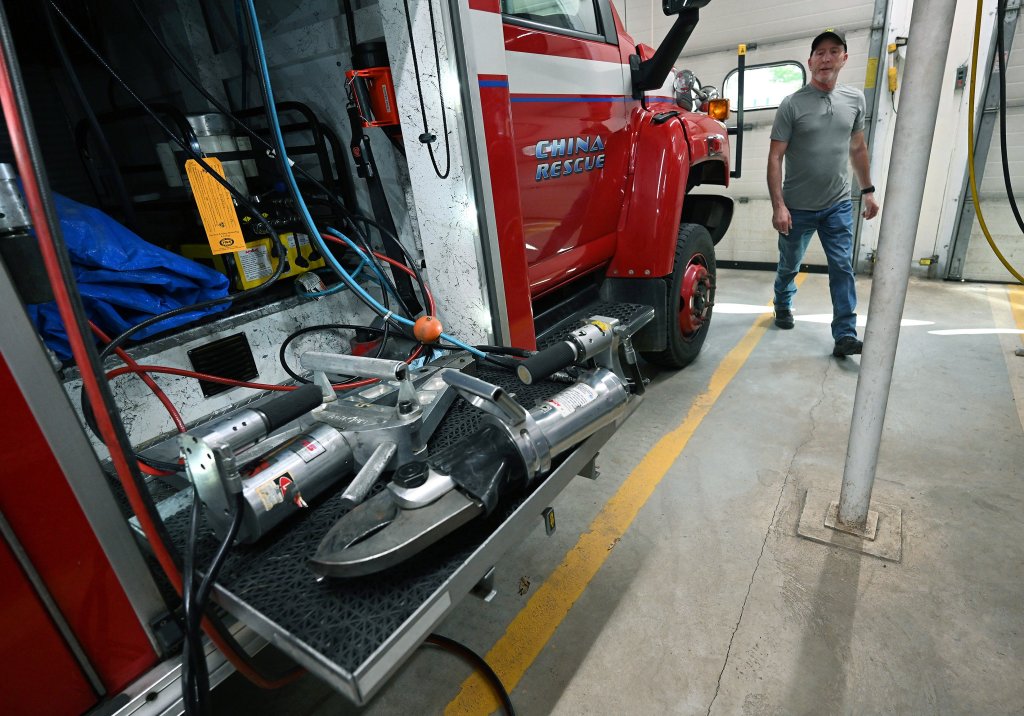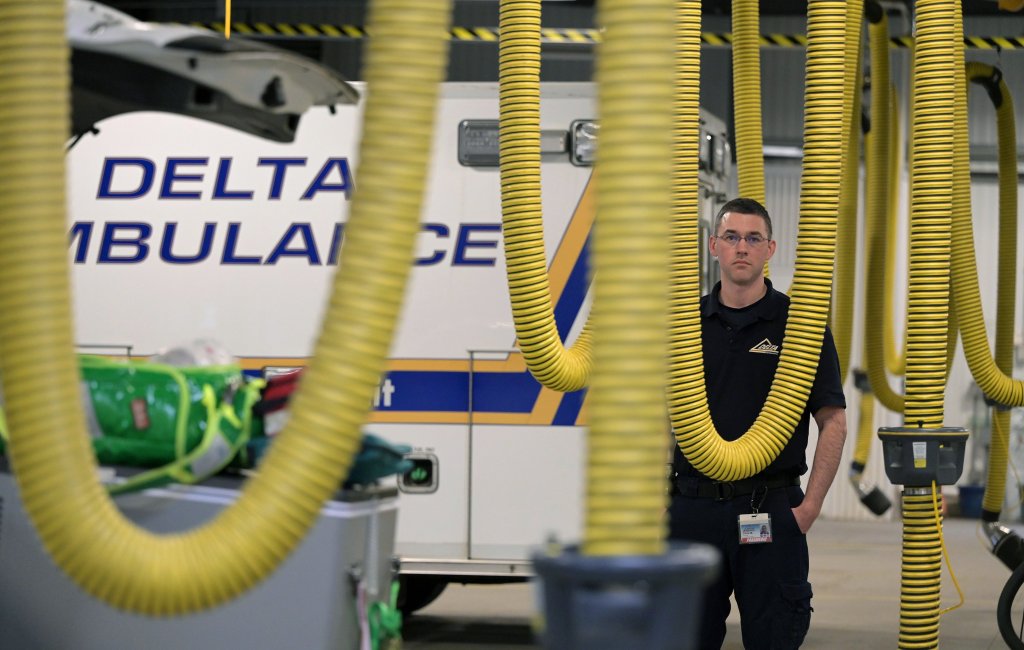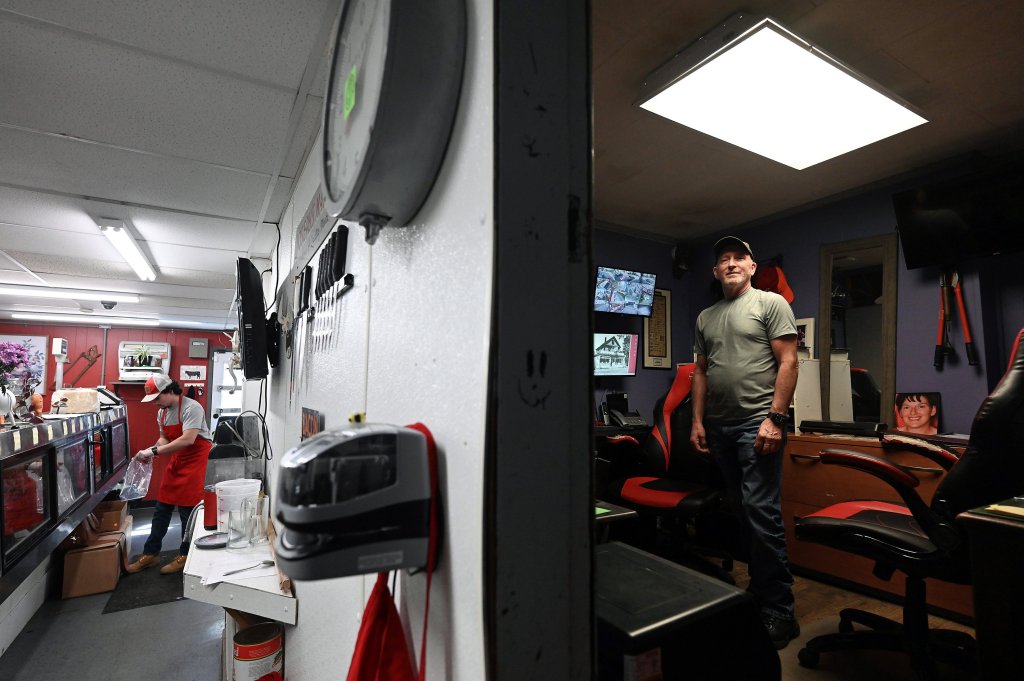
Delta Ambulance will raise its per capita rates next year by at least $20 for towns it contracts with, but that cost would increase if communities drop out of paying for the transport service.
The change, announced Wednesday morning at the China town office, raised questions about whether municipalities will begin transporting patients to hospitals themselves rather than paying the increasing fees to Delta, a nonprofit based in Waterville that provides transport services to 13 towns in Kennebec, Somerset and Lincoln counties.
Most of the area’s fire departments provide emergency medical services to residents but lack a license or ambulance to transport patients to the hospital. Instead, first responders supply basic or advanced care on scene while waiting for Delta, which has served the region for more than 50 years.
The service started charging communities with fees two years ago to address budget shortfalls caused by high operating costs and low insurance reimbursement rates. Fees will rise from $35 per capita to between $55 and $60 per capita in July 2026, Chris Mitchell, Delta’s executive director, said in a fact sheet handed out at the meeting Wednesday.
Mitchell said the fee increase will help address Delta’s continuing financial struggles.
In recent years, Waterville and Winslow started their own transport services, and earlier this month Fairfield, which runs an around-the-clock EMS service with Benton, voted to purchase an ambulance with funds donated by a former resident. Fairfield doesn’t have a license to transport patients to hospitals, and the town manager has said there are no immediate plans to do so, but some say the donation could give the town the option.
Losing Fairfield and Benton’s business would be “near a million-dollar loss,” Mitchell said. Even with other budget reductions, he said Wednesday, that would cause Delta’s rates for the other towns to go up to approximately $75 per capita.
That nearly $1 million includes both subsidies and insurance reimbursements.
Michelle Flewelling, Fairfield town manager, said Wednesday that the increase “is clearly higher than we would like” and the town “will have to decide what is best for its residents.”
Flewelling added: “It has not been lost on the town as to what could happen to the other municipalities should Fairfield-Benton decide to go on its own.”
For towns looking to start a service, transporting can be costly, said Danny McKinnis, who stepped down as China Rescue chief Tuesday ahead of the meeting with Delta officials. McKinnis, who runs Joseph’s Market in Waterville, said he needs to focus on his business.
“I just decided it was time to get out,” he said. “Plus, I’m not going to be committed too much to the transporting side of it, if we ever do it.”
McKinnis said starting — and staffing — a full-time ambulance service is not worth the revenue generated from patient insurance billing, and would require setting up mutual aid agreements with other local fire departments also facing resource shortages and long transport times.
He said during an interview in early September that it’s better to stick with Delta.
Wednesday’s announcement could change things for taxpayers, said Ben Loubier, China Rescue’s acting chief, who took the helm that morning.
“Delta is trying to do what they can do to be manageable and keep going to provide services to the towns,” Loubier said. “But on the flip side, the towns are trying to be fiscally responsible for the people that they serve, as well.”
FAIRFIELD CONSIDERS CHANGES
Fairfield, which signed a $226,730 contract with Delta this year, was given a $367,600 donation from a former resident in July to purchase an ambulance, which will replace the town’s medical truck.
Flewelling previously said Fairfield had no plans to start a transport service, but on Wednesday said “the new cost estimate may have a bigger impact on that conversation.”
With the new rates, she said Fairfield and Benton’s share of the subsidies, combined, would come out to nearly half a million dollars.
Mitchell has said Fairfield would need up to two staffed ambulances to transport and appropriately cover their call volume. If the town began transporting with one ambulance and called Delta for assistance, Mitchell said Delta would charge $900 per backup call.
Fairfield approved three full-time positions in the fire budget this year and has filled two of those positions. Flewelling said the council will consider whether it could add additional staff and a used ambulance for the same cost it would pay to Delta.
“Fairfield is in a unique situation, because we do respond to every single one of these calls when they come in already,” she said. “So it’s not like we’re trying to create a station, create a full-time department, gather all the equipment to provide the service ourselves. We already have 90% of it.”
Delta also announced that it’s planning to change its license from paramedic level to EMT level, which allows paramedics to be dispatched but does not require them on every ambulance, in order to preserve resources.
Flewelling said one argument at Wednesday’s meeting was that Delta is “doing a 60% increase on the price” while providing “less of the service.”
HIGH COSTS OF TRANSPORTING

Delta previously relied on insurance reimbursements and people paying bills to operate, but a higher call volume and operating costs in recent years have made it difficult to break even, Mitchell said.
“We’re not looking to make a profit,” Mitchell said Tuesday. “We’re basically just looking for the break even number right now, and this is what it costs to do that.”
Grants from MaineGeneral and subsidies from the towns have kept Delta from dipping into the red this year, but Mitchell said, operationally, it’s been “kind of a wash.”
“If we cut anything any further, it’s really going to start to impact service,” Mitchell said.
Delta’s fees are less than other ambulance services, like Unity Ambulance, which covers five towns and charges about $85 per capita, said Kevin McGinnis, former state EMS director who has worked in the field for 50 years and recently worked with Unity.
Starting a transport service, McGinnis said, could cost hundreds of thousands of dollars, including expenses for staffing, training, benefits, equipment and facility maintenance.
Over the past fiscal year, Waterville has lost money on transporting. Everett Flannery, Waterville deputy EMS chief, said it costs the city $450 every time an ambulance leaves the station, but they collect only an average of $420 or $430 per call. If the patient is not insured, Waterville ends up eating the cost.
The department is projected to collect $1.67 million of the $3.3 million they billed out to patients from August 2024 to July 2025. But Flannery said it’s better than past years when the department had no opportunity to generate revenue.
“We do not profit,” Flannery said. “You can see the incredible, incredible discrepancies of what we bill out to patients in their insurances and what we actually receive.”
Some of that is due to low Medicaid and Medicare reimbursement rates, said Wil O’Neal, state EMS director.
“They don’t cover the cost,” O’Neal said. “So then we’re stuck in this quandary where fundamentally the business tips, because it doesn’t make as much as it costs to run, but it’s an essential business.”

McKinnis said that when he heard about the meeting with Delta on Wednesday, he knew it was the right time for Loubier, a paramedic for China Rescue, to take over. Loubier said Wednesday afternoon that China and other towns may start looking at transporting if Delta’s costs keep going up.
China, located southeast of Waterville, is a largely rural area, making it difficult for ambulances stationed near bigger communities to respond to emergencies quickly. Town Manager Becky Hapgood said she has watched ambulances drive to the wrong community, costing extra minutes that can make the difference in a patient’s outcome.
China bought a second-hand ambulance in June to prepare for the worst, Hapgood said in early September.
“Like Fairfield, we just want to make sure we’re ready,” Hapgood said. “I at least feel that with the purchase of the new rig, in case Delta fails, we will hopefully be able to meet our community’s needs.”
INVESTING IN EMS SERVICES
In Maine, 15 out of 16 counties have ambulance deserts, where people live 25 minutes or more from an ambulance station, according to a 2023 study by the Maine Rural Health Research Center. Rural departments are also plagued by staffing difficulties.
These challenges call for mutual aid agreements, which most fire departments in central Maine already have, but EMS is more complicated. Because municipalities didn’t pay for Delta’s services before 2023, many fire departments had not developed medical transport services or EMS mutual aid agreements.
Waterville and Winslow have mutual aid agreements — where they don’t charge for backup calls — with each other and Delta. While the transport service does respond to calls for the two communities, Mitchell said Delta has had to prioritize its paramedic resources for the towns it contracts with that do not have the ability to transport.
Mike Murphy, Winslow fire chief, reached out to the Waterville fire chief in August to sign a new mutual aid agreement that relies less on Delta. He said he would do the same with Fairfield, if the town started transporting, to “find a quicker response time” with a regional approach.
“My ultimate thing was to get towns to work together,” Murphy said. “That’s all I’m looking for.”
Regionalizing EMS services has long been considered the solution for rural departments, but it would require enough municipalities to have the resources and communication to support each other.
Maine EMS is in the second round of distributing $19 million in grants to departments looking to purchase an ambulance, expand services or regionalize, including a $30,000 grant to Fairfield to outfit the new ambulance.
O’Neal said communities can start planning for a regional ambulance service by sharing resources and promoting services like community paramedicine — treating patients at their homes so they don’t have to dial 911 in the first place. Maine is rolling out formal community paramedic licensing in November, O’Neal said.
In the meantime, though, he said taxpayers will need to adjust to paying more for medical transport.
“This is a service that we said is essential,” O’Neal said. “At a baseline, the priority is to have it.”
Delta officials will have another meeting with town leaders Tuesday at the China town office.
Loubier, China Rescue’s acting chief, said the department will work with Delta to ensure the town’s residents have ambulance coverage.
“I don’t want to see Delta go away,” Loubier said. “We need them around.”

We invite you to add your comments. We encourage a thoughtful exchange of ideas and information on this website. By joining the conversation, you are agreeing to our commenting policy and terms of use. More information is found on our FAQs. You can modify your screen name here.
Comments are managed by our staff during regular business hours Monday through Friday as well as limited hours on Saturday and Sunday. Comments held for moderation outside of those hours may take longer to approve.
Join the Conversation
Please sign into your CentralMaine.com account to participate in conversations below. If you do not have an account, you can register or subscribe. Questions? Please see our FAQs.